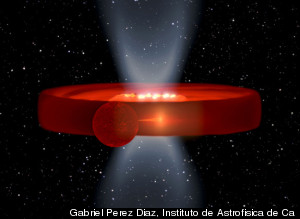 New results from looking at the split-second after the Big Bang indicate the universe is 80 million years older than previously thought and provide ancient evidence supporting core concepts about the cosmos — how it began, what it’s made of and where it’s going.
New results from looking at the split-second after the Big Bang indicate the universe is 80 million years older than previously thought and provide ancient evidence supporting core concepts about the cosmos — how it began, what it’s made of and where it’s going.
The findings released Thursday bolster a key theory called inflation, which says the universe burst from subatomic size to its now-observable expanse in a fraction of a second. The new observations from the European Space Agency’s $900 million Planck space probe appear to reinforce some predictions made decades ago solely on the basis of mathematical concepts.
Telescope that eyes Big Bang’s afterglow shows universe is 80 million years older than thought
Voyager craft 'exits' solar system
 The Voyager-1 probe has left the Solar System, according to some scientists. If confirmed, it would be the first man-made object to do so. Launched in September 1977, the probe was sent initially to study the outer planets, but then just kept on going.
The Voyager-1 probe has left the Solar System, according to some scientists. If confirmed, it would be the first man-made object to do so. Launched in September 1977, the probe was sent initially to study the outer planets, but then just kept on going.
Researchers who have studied its data indicate it has now entered a realm of space beyond the influence of our Sun. But the US space agency (Nasa) says there is still some doubt about this.
Physicists say they have found a crucial building block of the universe
 The search is all but over for a subatomic particle that is a crucial building block of the universe.
The search is all but over for a subatomic particle that is a crucial building block of the universe.
Physicists announced Thursday they believe they have discovered the subatomic particle predicted nearly a half-century ago, which will go a long way toward explaining what gives electrons and all matter in the universe size and shape.
'Most exotic' distant planets described
 U.S. astronomers say detailed observation of four planets orbiting a star relatively close to the sun has revealed them to be among the most exotic ones known.
U.S. astronomers say detailed observation of four planets orbiting a star relatively close to the sun has revealed them to be among the most exotic ones known.
The researchers said the findings were made possible by a first-of-its-kind telescope imaging system that allowed the astronomers to pick out the planets amidst the bright glare of their parent star and measure their spectra, the rainbows of light that reveal the chemical signatures of planetary atmospheres.
Nasa Curiosity Rover: new evidence that life may have existed on Mars
 An ancient network of rivers on Mars once made parts of the planet habitable for microbial life, according to the latest analysis from Nasa's Curiosity rover.
An ancient network of rivers on Mars once made parts of the planet habitable for microbial life, according to the latest analysis from Nasa's Curiosity rover.
Rock dust drilled from sediments in the giant Gale crater on the red planet were found to contain clay minerals that can have formed only in water, scientists said.
The discovery of other substances alongside the clays, such as calcium phosphate, suggest the soil was neutral or mildly alkaline, making the environment suitable for microbes.
Black Hole 'Mystery Wave' Takes Astronomers By Surprise
 Astronomers studying an unusual black hole system have spotted a never-before-seen structure in the disk of matter encircling the system.
Astronomers studying an unusual black hole system have spotted a never-before-seen structure in the disk of matter encircling the system.
Swift J1357.2, an X-ray binary system that regularly emits outbursts of high energy, consists of a black hole slowly consuming its companion star. Matter from the doomed star falls into the accretion disk, which surrounds the black hole, feeding it dust and gas. While observing the system, a team of scientists noticed an unusual vertical feature traveling through the material.
New planet seen forming inside gas cloud
 Astronomers studying the disc of gas and dust surrounding the young star HD 100546, which at 335 light-years is relatively near to Earth, believe they are witnessing the birth of a gas giant similar to Jupiter, although up to three times larger.
Astronomers studying the disc of gas and dust surrounding the young star HD 100546, which at 335 light-years is relatively near to Earth, believe they are witnessing the birth of a gas giant similar to Jupiter, although up to three times larger.
If their discovery is confirmed, it would allow huge leaps in our understanding of how planets take shape by allowing scientists to compare their theories against direct observations from the new planet.
More Articles...
Page 27 of 61

 Science Glance
Science Glance






























